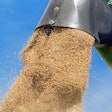
In my job, I work exclusively with commercial grain elevators helping them navigate their way through merchandising decisions and other day-to-day challenges. I don’t buy cash grain from farmers or work directly with them on their marketing plan. An elevator’s healthy bottom line, however, is highly dependent on having a strong origination program and good farmer relationships, and a major contributor to doing this successfully is being the one out there delivering a consistent message to producers.
In the spirit of this belief, my colleagues and I present marketing meetings to farmers on behalf of our elevator customers. A few years ago, I prepared for my first such presentation. I had my slide show all ready and knew what I wanted to say. It was all there, yet the more I rehearsed the presentation, the more I thought, “This is too simple.”
I turned to one of my more experienced colleagues to discuss my concern. “Everything I’m presenting is so obvious,” I said. “Anyone could figure this out.” He gave me advice that has stuck with me as I have prepared to give that and every subsequent presentation, “Don’t be ashamed of giving a simple message.”
My message is simple, but more importantly, it’s coming from the elevator through me.
The message
In a typical year, corn and bean prices rally during the spring and early summer as concerns about the crop inevitably set in. For wheat, the rally tends to come an entire year before harvest with planted acres and future supply unknown. As the growing season progresses and the crop conditions tend to even out, that premium will go away as long as no major issues persist. Though acting on it may be emotionally tougher than recognizing it, most people in the ag industry understand this is a good opportunity for farmers to get grain sold. Setting aside emotion and fear of missing out on a black swan event to sell grain at profitable prices before harvest is the simplest, best advice we can give producers.
That’s it. I give a 45-minute marketing talks with no mention of how high I think the market will or could go. Encouraging them instead to focus on locking in profit at a time when marketing is free and prices tend to rally. I wish I could take credit for coming up with this strategy, but of course none of you would believe me. Or would you? Would your customers?
Competition in the grain industry is certainly nothing new, and I believe no industry is great without it. But it seems there are more and more people out there offering solutions to farmers for their grain marketing woes all the time. There are only so many tools available to market grain so, most of the time they are offering the same things that have been available for years while putting it in a different wrapper. Indeed, they may very well be slapping a different name on something you already offer.
How could that possibly work? Could someone go to your customers and lure them away by offering the same thing you can give them? It absolutely can work and it happens all the time. It seems the most important part of the message is who is giving it. You need to be the one giving the message to your customers.
If you are not the one talking to your customers about marketing, someone else will. You have to sell yourself and your services. You have to deliver your message and not be ashamed of giving a simple one. Coming to the elevator in the morning and turning on the lights is not an origination plan that built for long term success.
Here are a few things to consider as you get your word out.
- Communicate regularly
Make sure you are always delivering your message. Be clear about what you’re offering and what you can do for them. Keep yourself in front of your customers — the best way is face to face. Whether it’s one-on-one or in a meeting, people like doing business with someone they know. Social media can offer support to your message between these interactions. Make sure your customers know what you’re about, what you offer, and what you believe in. - Garner trust
Be the farmer’s trusted advisor. This does not mean that you advise them on how high the price will go but rather that your goal is to help them succeed and will give unbiased help and advice. They will be approached by other people offering them contracts and services. Encourage them to come to you before assuming someone else is offering something you do not. This is a great opportunity for you. If it is something you offer, this gives you a chance to sell your service, and if it is not, it gives you a chance to explain why. - Promote yourself
Buy commodities, don’t be one. Make sure your customers know why they should do business with you. The country elevator is a service-oriented business. Show your customers (through words and actions) that you are more than a price. Winning business on price alone is a losing battle. Everyone else will always know how to beat you at that game. - Be consistent
If you are constantly touting a new angle or fancy contract, it seems as though you are just throwing darts at the board. On the other hand, if you always encourage farmers to have pricing goals, put in firm offers and lock in profit with no additional costs, it portrays that you believe in the system. Be willing to discuss marketing alternatives, but always refer back to the basics. - Communicate with purpose
Ultimately you want to buy the farmers’ grain. Approach your conversations with this end goal in mind. That does not always mean selling grain that day, but often to put in firm selling targets. Coax them toward action and always ask for their business.
Prior to my current position, I ran a country elevator. I was consistent and stubborn in my approach of marketing through targets and cash contracts to the point where I would refuse to offer almost any other marketing alternatives. I see now that a better approach is to not say “no,” but rather explain why simple, free alternatives tend to be a better plan.
The country grain elevator is the most beautiful middleman I know. We exist to give service to grain sellers and buyers without taking our profits from them. Believe this and sell it to your customers. ■
About the author
Tracy Henkel is a grain merchandising specialist with White Commercial Corp. He helps grain elevators across North America maximize their merchandising opportunities and strengthen their relationship with producers through profit-based grain origination. He can be reached at [email protected] or follow him on twitter @thenkelWCC.


















